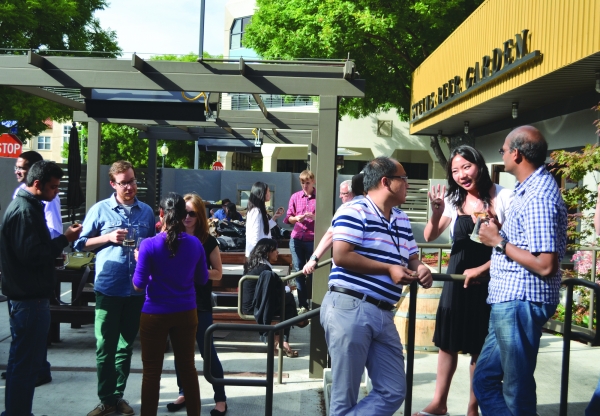
Pre-coronavirus, customers gather in Steins outdoor patio on Villa Street in Mountain View. Photo by Katie Brigham/Mountain View Voice.
Owner Ted Kim said he knew it would be impossible for the Villa Street restaurant to survive on takeout and delivery alone. Santa Clara County preemptively implemented the state's regional stay-at-home order this week, requiring restaurants to shut down outdoor dining starting Sunday night until at least Jan. 4.
"After careful consideration our best option of survival is to shut everything down now, save as much money as we can and hope to reopen next year when (hopefully) a new stimulus bill is available, the vaccine is more ubiquitous and fear of COVID isn't as prevalent in the area," Kim said.
Kim had already closed Steins' Cupertino location early in the shutdown, reduced his staff by more than half and had to apply for unemployment himself in April. He put plans to expand throughout California on hold.
When Santa Clara County allowed outdoor dining to resume this summer, sales rebounded to about 30% of what Steins usually makes, and even more so when indoor dining briefly resumed in the fall, Kim said. But the numbers started dropping again the last few weeks, to about 15 to 20% of normal sales.
"Even without the stay-at-home order, it was looking really tough. The stay-at-home order was just the nail in the coffin," Kim said.

Diners eat outside on Castro Street in Mountain View, which has been closed to traffic since this summer. Photo by Magali Gauthier.
As soon as Kim heard the news about the local order taking effect Sunday night, he rushed to notify his staff.
"For our staff, every paycheck is super vital and to suddenly realize you only have two more days of work and to start preparing for what you're going to do next is very daunting," he said. "This the climate. This is how it's been since March."
In interviews since the county's expedited the stay-at-home order, Kim and other local restaurant owners expressed dejection and frustration at the devastation small businesses are experiencing amidst increasing public health restrictions.
"We're stuck in the middle of being in a state and county where we feel like there is an overwhelming leaning toward the health aspect of COVID, which we completely get (but) sometimes it feels like businesses are left at the wayside," Kim said. "We get the restrictions, but send us more help."
Calls have been intensifying for the federal government to pass another stimulus bill to help struggling restaurants, as well as to pass the RESTAURANTS Act, which would establish a $120 billion restaurant revitalization fund.
Locally, the Santa Clara County Board of Supervisors unanimously approved on Tuesday a new small business loan program in partnership with the state's California Rebuilding Fund. The county hopes to provide an immediate $6 million in low-interest loans to small businesses as a first step in a program they hope will provide as much as $100 million in loans. The initial loans will range from $5,000 to $100,000, have a 4.25% interest rate and
be available for qualifying small businesses with 50 or fewer full-time employees. Several restaurant owners said relief like grants and tax forgiveness would be more impactful after frustrating experiences with the federal Paycheck Protection Program (PPP) and taking on other loans to keep their businesses afloat this year.
The Santa Clara County Board of Supervisors also expressed support this week for a proposed cap on the delivery fees third party platforms can charge restaurants. The fees can be as high as 30% and in many cases eat up a restaurant's entire profit margin — for Kim, this contributed to his decision to close Steins temporarily.
"The biggest share of COVID-related unemployment has come in our local restaurant industry," Santa Clara County Board of Supervisors President Cindy Chavez said in a press release about the delivery caps. "Just as we have done with our moratorium against commercial evictions, we must do what we can to help these restaurants survive."
(San Mateo County, Marin County, Alameda County, the cities of Santa Clara and San Francisco are among the local jurisdictions that have adopted similar limits on delivery fees.)
Kim predicted more independent restaurants will close in the coming weeks and months or, like him, go into hibernation until conditions improve enough to operate at sustainable levels. The Fish Market temporarily closed its Palo Alto and Santa Clara locations as of Dec. 2, writing on Facebook that "we can't wait to welcome you back in when conditions improve." Without indoor or outdoor dining, the owner of Rangoon Ruby temporarily closed the downtown Palo Alto restaurant and consolidated it with Burma Ruby several blocks away. Other local restaurants, meanwhile, are still temporarily closed from the first shutdown.
Kim hopes to reopen Steins next spring but will have to wait and see what things are like then.
"Not a single person isn't feeling just really a little hopeless, a little burnt out," Kim said of small business owners.



